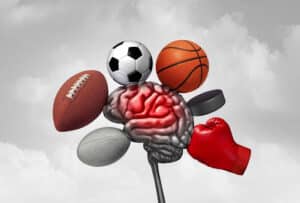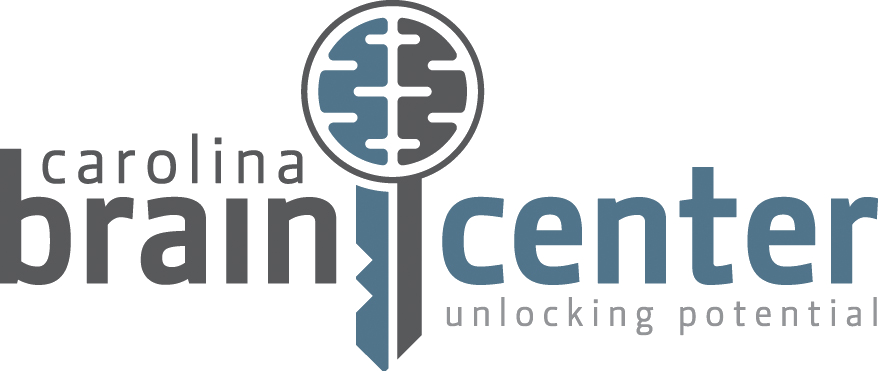 Concussions are a serious issue, especially for young adults. At Carolina Brain Center, we see firsthand how important it is to take brain health seriously, especially when it comes to concussions. In this article, we’ll dive into what concussions are, the differences between getting a concussion as a child versus as a young adult, and why it’s so important to focus on brain health.
Concussions are a serious issue, especially for young adults. At Carolina Brain Center, we see firsthand how important it is to take brain health seriously, especially when it comes to concussions. In this article, we’ll dive into what concussions are, the differences between getting a concussion as a child versus as a young adult, and why it’s so important to focus on brain health.
Understanding Concussions
A concussion is a type of brain injury caused by a bump, blow, or jolt to the head. This sudden movement can make the brain bounce around or twist in the skull, creating chemical changes and sometimes damaging brain cells. Concussions can affect memory, judgment, reflexes, speech, balance, and coordination. The symptoms might show up right after the injury or not until days later. Common signs include headaches, confusion, dizziness, nausea, and sometimes loss of consciousness.
Concussions can happen to anyone at any time. Whether you’re playing sports, involved in a car accident, or even just taking a hard fall, the risk is there. The brain is a sensitive organ, and even a seemingly minor hit can have significant consequences. This is why it’s crucial to recognize the signs and symptoms of a concussion and take immediate action if you suspect you have one.
Concussions in Children vs. Young Adults
Children:
When children get concussions, their brains are still developing. This means they might recover more quickly in some cases, but they also face unique risks. Their brain tissues are more pliable, which can sometimes result in less immediate damage but can cause more long-term issues. Children might have trouble explaining how they feel, making it harder for parents and doctors to understand the severity of the injury. It’s also essential to consider their academic and social development. Missing school and activities due to concussion symptoms can significantly impact their growth and learning.
Additionally, children’s brains are more susceptible to the effects of a second concussion if they haven’t fully recovered from the first one. This condition, known as second impact syndrome, can lead to severe complications, including brain swelling and even death. Therefore, it’s crucial for parents and caregivers to ensure children fully recover before returning to any activities that might put them at risk for another head injury.
Young Adults:
For young adults, the situation is different. While their brains have mostly developed, they are more likely to experience lasting effects from concussions. This age group is often involved in high-risk activities like sports, driving, and physically demanding jobs. The pressure to perform academically and socially can also lead to pushing through symptoms rather than resting, which is crucial for recovery. Additionally, young adults are at a stage where they’re making significant life decisions, and a concussion can disrupt plans, career paths, and overall life goals.
Young adults may also face challenges in recognizing the severity of their injury. There’s a tendency to downplay symptoms or attribute them to other causes like stress or lack of sleep. This can delay seeking proper treatment and prolong recovery. Moreover, the demands of higher education or early career responsibilities can make it difficult to take the necessary time off for proper healing.
The Importance of Focusing on Brain Health
Brain health is crucial at any age, but young adults need to pay special attention. Here’s why:
- Academic Performance: Young adults are often in college or starting their careers. A concussion can disrupt studies, lead to missed classes, and lower grades. It’s important to recognize that rest and recovery are essential to getting back on track.
Academic pressure can be intense, and trying to keep up with coursework while dealing with concussion symptoms can be overwhelming. It’s essential to communicate with professors and academic advisors about your condition. Many educational institutions have accommodations in place for students recovering from concussions, such as extended deadlines and adjusted workloads. - Long-term Impact: Ignoring concussion symptoms can lead to long-term problems. Chronic headaches, memory issues, and mood changes can significantly affect one’s quality of life. It’s vital to address concussions properly to avoid these long-term consequences.
Long-term impacts aren’t just physical. Persistent concussion symptoms can lead to feelings of frustration, anxiety, and depression. It’s important to seek support not only for the physical aspects of recovery but also for the emotional and psychological challenges that may arise. - Mental Health: Concussions can lead to anxiety, depression, and other mental health issues. Young adults already face significant stress from their responsibilities, and a concussion can exacerbate these problems.
Mental health is just as important as physical health. If you’re experiencing mood changes, difficulty sleeping, or feelings of sadness or anxiety following a concussion, don’t hesitate to seek help from a mental health professional. Addressing these issues early can prevent them from becoming more severe over time. - Holistic Healthcare: At Carolina Brain Center, we emphasize the importance of holistic healthcare services. Treating a concussion isn’t just about addressing the immediate symptoms but also about supporting overall health. This includes physical therapy, nutritional counseling, and stress management.
Holistic care involves looking at the whole person, not just the injury. By supporting the body’s natural healing processes and addressing all aspects of health, we can help you recover more fully and prevent future issues. This approach can include chiropractic care, massage therapy, acupuncture, and other complementary treatments that support the body’s healing.
How to Handle a Concussion
If you suspect you have a concussion, here’s what to do:
- Seek Medical Attention: Visit a healthcare professional who specializes in concussions. If you’re in the area, consider a visit to a concussion clinic in Raleigh, NC. They can perform a thorough evaluation and recommend the best course of treatment.
- Rest and Recovery: Give your brain time to heal. Avoid physical activities and get plenty of sleep. It might be frustrating, but it’s crucial for recovery.
Rest doesn’t just mean avoiding physical exertion. It also means giving your brain a break from cognitive activities that can strain it, such as reading, screen time, and problem-solving tasks. Take it easy and allow yourself the time to heal. - Follow Up: Keep up with follow-up appointments to monitor your progress. Sometimes symptoms can change or new ones can appear later on.
Regular check-ins with your healthcare provider can help ensure you’re on the right track and allow for adjustments to your treatment plan as needed. Don’t skip these appointments, even if you’re feeling better. - Holistic Approach: Look into holistic healthcare services to support your recovery. At Carolina Brain Center, we offer a range of services to help with concussion recovery, from chiropractic care to nutritional advice.
Incorporating holistic treatments can enhance your recovery process. Nutritional counseling, for example, can ensure you’re getting the nutrients needed to support brain health and healing. Stress management techniques like mindfulness and relaxation exercises can help reduce stress and promote overall well-being.
Why Choose a Chiropractic Neurologist?
Dealing with a concussion is not just about immediate treatment; it’s about long-term care. Visiting a neurologist specializing in post concussion syndrome can make a significant difference. Specialists understand the complexities of brain injuries and can provide personalized care plans. They can help manage symptoms, offer rehabilitation options, and provide support for mental health issues that might arise.
Choosing a specialist means you’re getting care from someone who has extensive experience and knowledge in treating concussions and their aftermath. They can offer advanced diagnostic tools and treatment options that general practitioners might not have access to.
Prevention Tips
Preventing concussions is as important as treating them. Here are some tips:
- Wear Protective Gear: Whether you’re playing sports or working in a risky environment, always wear appropriate protective gear.
Helmets, pads, and other protective equipment are designed to absorb impact and reduce the risk of injury. Make sure your gear fits properly and is in good condition. - Follow Safety Guidelines: Adhere to safety rules in sports, driving, and other activities.
Safety rules are there for a reason. Following them can significantly reduce your risk of injury. Be aware of your surroundings and take precautions to protect yourself. - Educate Yourself: Learn about the symptoms of concussions and take them seriously. Educate friends and family, too, so they understand the importance of brain health.
The more you know about concussions, the better prepared you’ll be to recognize and respond to them. Share this knowledge with others to help create a safer environment for everyone. - Stay Fit: Physical fitness can help improve balance and coordination, reducing the risk of falls and injuries.
Regular exercise strengthens your muscles and improves your balance, making you less likely to fall or sustain an injury. Activities like yoga and tai chi can be particularly beneficial for enhancing balance and coordination.
The Role of Carolina Brain Center
At Carolina Brain Center, we are committed to helping young adults navigate the challenges of concussions. Our team offers comprehensive care tailored to each individual. We believe in treating the whole person, not just the symptoms. From initial assessment to long-term recovery plans, we are here to support you every step of the way.
Concussions are a serious issue, especially for young adults. Understanding the differences between concussions in children and young adults, focusing on brain health, and seeking proper care are all crucial steps in dealing with this injury. If you or someone you know is dealing with a concussion, don’t hesitate to reach out to a concussion clinic in Raleigh, NC, or find a neurologist specializing in post concussion syndrome near me. Remember, taking care of your brain is taking care of your future.
For more information or to schedule an appointment with chiropractic neurologist Dr. Dane, please head to CarolinaBrainCenter.com. We’re here to help you on your journey to recovery and overall brain health.

